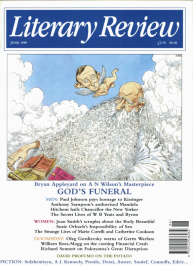Stephen Amidon
Dog’s Tale
Timbuktu
By Paul Auster
Faber & Faber 136pp £12.99
Novels about animals are tricky acts to pull off. Anthropomorphism and sentimentality threaten to undermine the narrative if the author makes his characters too human, while a terminal case of so-whatness looms if he stays strictly in the realm of the feral. Perhaps this is why so few writers of adult fiction employ animals as their protagonists. In recent memory, only the she-wolf in Cormac McCarthy's The Crossing has succeeded as a credible and engrossing beast-hero.
Timbuktu, Paul Auster's first work of fiction in five years, attempts to inhabit this difficult narrative terrain. It tells the story of Mr Bones, a mongrel dog belonging to Willie Christmas, an 'outlaw poet prowling the gutters of a ruined world'. Master and beast spend half the year wandering America and the other half holed up in Willie's mother's New York apartment, where the poet scrawls doggerel verse no one will ever read and the mutt sleeps by the heater. It is a pretty good life for a dog, although Willie's tendency to lapse into madness since his 'schizo flip-out of 1968' makes for occasional hard times – 'whenever the pinball machine in his head speeded up and went tilt, all bets were off.' Mr Bones's existence is thrown into chaos when Willie contracts a terminal cough. Knowing his days are numbered, the delirious poet drags Mr Bones down to Baltimore, where he hopes to turn his care over to a fondly remembered teacher from his childhood. They make it no farther than the Edgar Man Poe museum, where Willie finally gives up the ghost. Knowing that he'd better find a new master if he's to elude death row at the city pound, Mr Bones takes up with Henry Chow, a lonely eleven-year-old Chinese-American boy.
They spend an idyllic summer wandering the strange city, until Mr Bones is discovered by Henry's dog-hating father, who also happens to be the proprietor of a Chinese restaurant. Having heard that dogs are likely to wind up on the menu at such places, Mr Bones reluctantly flees to Virginia,

Sign Up to our newsletter
Receive free articles, highlights from the archive, news, details of prizes, and much more.@Lit_Review
Follow Literary Review on Twitter
Twitter Feed
It wasn’t until 1825 that Pepys’s diary became available for the first time. How it was eventually decrypted and published is a story of subterfuge and duplicity.
Kate Loveman tells the tale.
Kate Loveman - Publishing Pepys
Kate Loveman: Publishing Pepys
literaryreview.co.uk
Arthur Christopher Benson was a pillar of the Edwardian establishment. He was supremely well connected. As his newly published diaries reveal, he was also riotously indiscreet.
Piers Brendon compares Benson’s journals to others from the 20th century.
Piers Brendon - Land of Dopes & Tories
Piers Brendon: Land of Dopes & Tories - The Benson Diaries: Selections from the Diary of Arthur Christopher Benson by Eamon Duffy & Ronald Hyam (edd)
literaryreview.co.uk
Of the siblings Gwen and Augustus John, it is Augustus who has commanded most attention from collectors and connoisseurs.
Was he really the finer artist, asks Tanya Harrod, or is it time Gwen emerged from her brother’s shadow?
Tanya Harrod - Cut from the Same Canvas
Tanya Harrod: Cut from the Same Canvas - Artists, Siblings, Visionaries: The Lives and Loves of Gwen and Augustus John by Judith Mackrell
literaryreview.co.uk